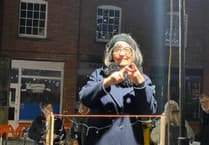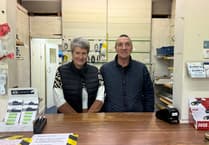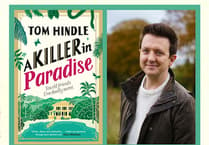IMAGINE the scene: it’s 1768, and a child - not quite six - is playing by himself upstairs in his father’s cottage, in the space under the thatch.
Suddenly there are angry voices, heavy feet on the ladder, and the little boy finds himself confronted by two large, indignant men. In front of him, a row of horseshoes hangs from nails on a beam; in his hand is a small iron rod.
This all happened in Upton Hellions. Alas, John Davy was no doubt forced to give back the horseshoes he had chosen to make a perfect octave on which he could copy the sounds of the church bells. But he was embarked on a musical career; and he was only one of many in Crediton and its district in the 18th and 19th centuries.
There was Richard Partridge of Kennerleigh, blind for many years, Samuel Chapple, born in Crediton and blinded by smallpox at the age of nine years and William Holmes, from Newton St Cyres.
That’s not even to mention the several composers in Exeter and beyond, like Willam Thorn of Moretonhampstead: an energetic gentleman he must have been, as he ran the Bell Inn as well as writing and teaching music. Widowed young, he brought up a family of six.
Who now remembers all the music written right here in Devon?
The West Gallery Quire, based here in Crediton, regularly sings the hymn-tunes, psalms and anthems they produced. It’s all pretty lively, with a sound more folk than cathedral. After all, every one of these tunes must have been copied out by hand, a laborious task you wouldn’t bother with if the music was boring.
The singers and players who learned these pieces and sang them in church were the same people who roared out drinking songs and glees in the pub of a Saturday night: nor were they always entirely sobered up by the time of Sunday service.
They wanted a good strong tune. They liked a bit of fancy stuff: some fuguing, where each part comes in in turn. And if they were going for sad, they didn’t hold back.
The Dying Christian to his Soul is a masterpiece of gloom, even if it does have a positive message.
A wonderful picture of the range of Devon’s music in the 18th century comes in an account of a procession in Moretonhampstead in which a "fat heifer" was decorated with ribbons and driven through the town, while William Thorn walked before playing "Peace and Plenty."
The heifer was then killed and roasted along with 25 legs of mutton and other meat, and served with 1,400 helf-pound cales, four hogsheads of cider and some beer, so that the "afternoon … may be spent in the most convivial manner and with the greatest decorum."
Most of the wonderful music written across Devon has been hidden away in rare published works, like Chapple’s Setts of Anthems, or preserved in archives, such as the Cruwys Morchard and Downes manuscripts, held at Devon Heritage Centre.
West Gallery Quire is lucky enough to have several able researchers, and much of its repertoire is produced through their efforts.
Sometimes they are even lucky enough to get the music straight from the horse’s mouth: a tune for While Sheperds Watched from Ipplepen was sung to us by a lady who grew up there and heard it sung as a child. It’s wonderful to take a survival like that, get it into written form, and pass it on to future generations.
The Quire is one of Crediton’s best-kept secrets, but there is a chance for more people to get involved. Anyone who would like to, can go along and sing or play (woodwind or strings) on June 30 at the Congregational Church in Crediton, where the members of the Quire hope to share their love of this wonderful local music. Anyone can join in!
Please contact Clare Bainbridge on 01363 777220 or email: [email protected] for more details, or visit the website: creditonwestgallery.org.uk , where there’s more about the music, and a booking form for June 30.
The West Gallery Quire




.jpeg?width=209&height=140&crop=209:145,smart&quality=75)
Comments
This article has no comments yet. Be the first to leave a comment.